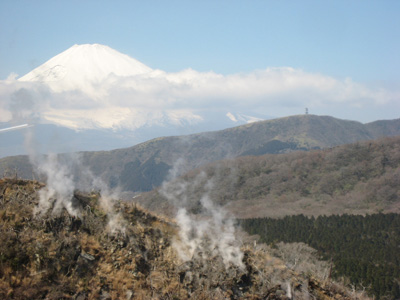Alumni Association
Dr. Richard Walker (University of Oxford)
30 April 2009
JSPS Short Term Postdoctoral Fellowship
Host Institution: National Institute of Advanced Industrial, Science and Technology (AIST)
Report: Dr. Richard Walker (University of Oxford)
(January 2009- April 2009)
Fellow: Dr. Richard Walker, Royal Society University Research Fellow, Oxford University, U.K
Contact: richw@earth.ox.ac.uk
I am a Postdoctoral Research Fellow at the Oxford University Department of Earth Sciences. I spent three months in Japan, from January to April 2009, compiling a map of active faults and earthquake hazard in Mongolia. The project was performed in collaboration with Prof. Yasuo Awata, at the Active Fault Research Centre of the Geological Survey of Japan, which is itself based at the National Institute of Advanced Industrial Science and Technology (AIST) in Tsukuba.
Why travel to Japan to study Mongolia? The active faulting in Mongolia is of interest in Japan because the arid environment of Mongolia is ideal for the study of active faults and has the potential to yield insights that can be applied to understanding the hazard posed by faults in urban areas - a subject of prime importance in Japan!
Tsukuba is a modern planned city housing many large research centres - you can assume that most people you will meet will be scientists of one type or another! It sounds a bit scary ... but I have enjoyed every minute of my stay there. There are many parks and interesting museums, it is easy to cycle around, and the relatively small size makes it very friendly and welcoming (there are a lot of web resources for finding your feet in Tsukuba, listing clubs, activities, etc.). And if you do crave the big city it is just 40 minutes into the centre of Tokyo on the train ... so there is nothing to stop you heading out to the bright lights on an evening!
I am very pleased that I took the time to learn some Japanese language. Even a few words of Japanese can go a long way - especially if you find yourself off the beaten track! Check before you arrive whether your host institute offers language courses (which might be heavily subsidised!), and also to find out the deadline for signing up (I almost missed the deadline!).
Make the most of your time in Japan by travelling! The high-speed rail network puts large parts of the country within reach within just a few hours of travel and I have had some very rewarding weekend and day trips. A particular highlight for me was a visit to the World Heritage village of Shirakawa-go in the Japan Alps. The volcanic region of Hakone near Tokyo is great for getting the postcard views of Fuji-san and for relaxing in an onsen bath! The historic centres of Kamakura and Nikko should not be missed ... and make sure you get to know Tokyo. It really is an amazing place!
Another excellent reason to travel is to visit universities where researchers are involved on work complimentary to your own. I presented my work at the Universities of Hokkaido, Hiroshima, Kyoto, Tokyo, and Tsukuba. The contacts you will make through these meetings will be extremely helpful in continuing your collaborative research in Japan.

















